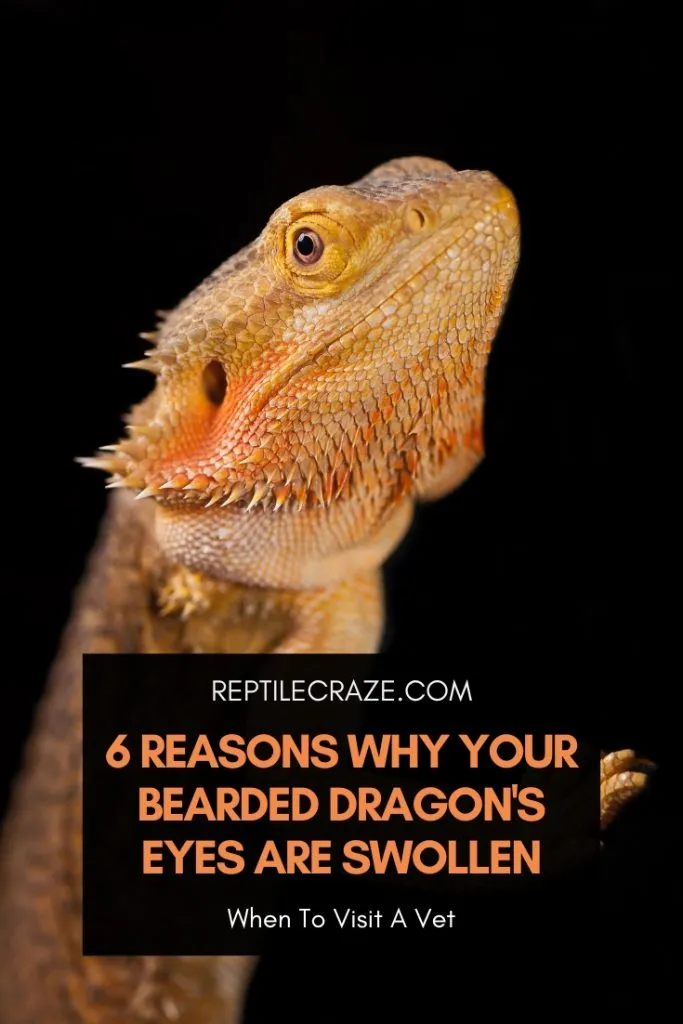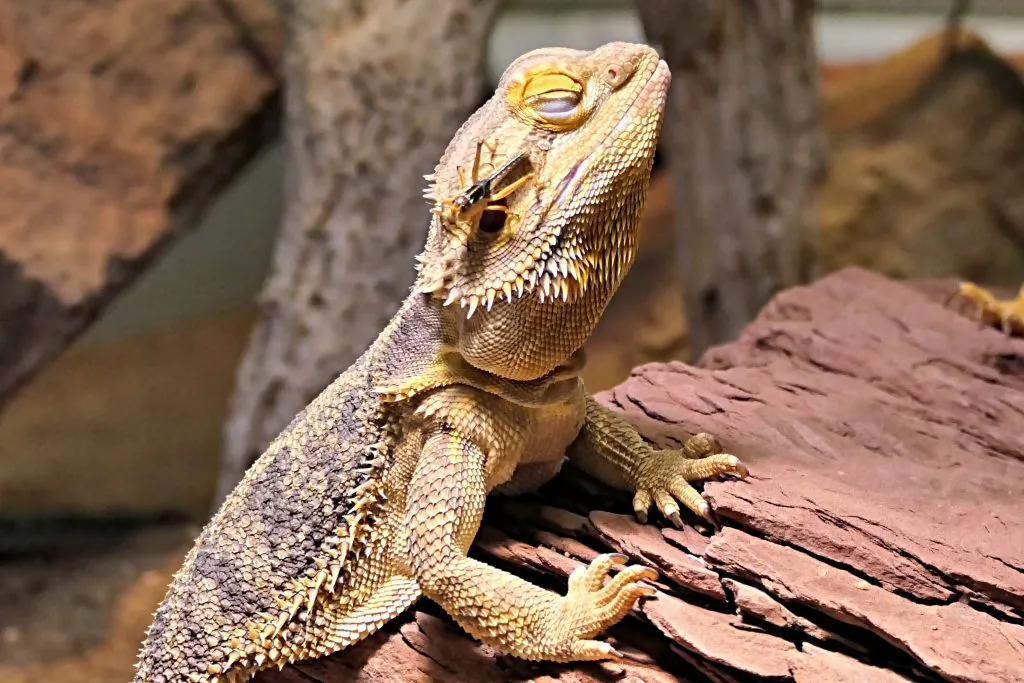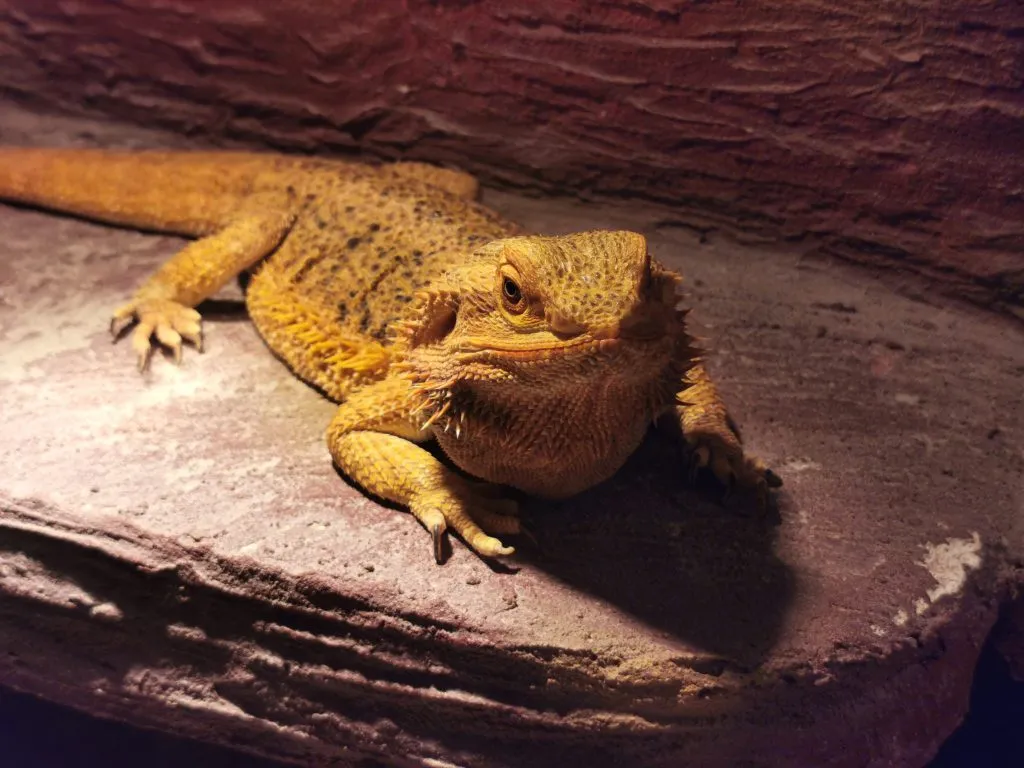
Since their eyes are proportionally small, it’s usually easy to tell when a Bearded Dragon’s eyes are swollen. Once you’ve spotted it, the difficult part could be knowing how to solve it and getting your Beardie back looking their best (how fast can you say that one?)
Reasons for swollen eyes in a Bearded Dragon can be related to blood pressure, diet, mechanical damage, mites, vitamin deficiencies, and respiratory infections.
In this article, we’ll explain how the above can contribute to swollen eyes in Bearded Dragons. We’ll also describe additional signs which suggest your Beardie needs to be examined by a veterinarian.
Let’s get started!
Why Your Bearded Dragon’s Eyes Are Swollen
In case you want to compare your Beardie’s swollen eye with another unlucky Beardie, take a look at the video below.
Now, let’s explore the reasons why Bearded Dragons can suffer from swollen eyes!
Note: A swollen eye is different from a bulged out eye. Beardies can bulge out their eyes on command and there are several reasons for that. Read our article on bulging eyes in beardies here.
1. High Blood Pressure
Herpetologists hypothesize that Bearded Dragons may be able to adjust their blood pressure.
This could be in response to illness, their diet or on purpose for another unknown reason. Scientists aren’t yet able to explain the mechanism or reason behind how Bearded Dragons could adjust their own blood pressure, it’s still a theory.
High blood pressure could even be linked to an improper diet, which we’ll discus in the next section.
2. Improper Diet
A diet that doesn’t contain the appropriate nutrients in the correct amounts could have a negative effect on your Beardie’s eyes and can also be linked to obesity We’ll talk more about a specific type of dietary insufficiency later (Hypovitaminosis A).
Make sure that your Bearded Dragon is getting everything it needs (in the correct amounts) by feeding it the correct diet. If you’re not sure what to feed your Bearded Dragon, contact a specialist reptile veterinarian to help you.
You can read more about a suitable diet for Bearded Dragons here.
3. Mechanical Damage

Eyes in any species are extremely sensitive. Bearded Dragons can hurt their eyes after contact with objects in their enclosure or during handling.
To reduce the chances of this happening, make sure that all the components in your pet’s enclosure are certified to be Bearded Dragon friendly.
Also, make sure that you handle your bearded dragon in an appropriate place to minimize the risk of any injuries occurring to you or your pet!
Tip: Don’t forget, always wash your hands before and after handling your Bearded Dragon!
4. Your Bearded Dragon is Suffering From Mites
The delicate eye area is an ideal area for reptile mites to live. This is because the skin in this area is much softer and easier for these pesky parasites pierce and to take a bloodmeal.
The resulting damage can irritate a Bearded Dragon’s eye and cause it to swell. If you think your Bearded Dragon might have mites, here are some more signs to look for:
- Tiny red or black spots on the skin or in their enclosure(that’s the mite!)
- Pruritis (itchyness)
- Behavioral changes such as more tired or restless than usually
If you suspect your Bearded Dragon has mites, you’ll need to visit a reptile veterinarian who’ll give you medicine to treat the infestation. Don’t forget, you’ll also need to clean the mites and eggs within your pet’s enclosure.
Tip: If you are worried that your bearded dragon might be suffering from an eye infection, read our article on that here!
5. Your Bearded Dragon Has a Vitamin A Deficiency
Vitamin A is really important for Beardies to maintain healthy skin and eyes. Deficiency in Vitamin A is usually associated with an inadequate diet and is common in reptiles who eat more insects than plant material.
Vets note the following symptoms could be an indication of hypovitaminosis A in Bearded Dragons (source: Patton Veterinary Hospital):
- Squinting
- Loss of appetite
- Skin color becoming dull
- More tears than normal
- Difficulty shedding
Vets diagnose hypovitaminosis A by looking for the above signs and asking questions about a Beardie’s diet.
If the signs haven’t progressed too far, the symptoms can be resolved by adjusting their diet accordingly and making sure that all enclosure parameters (temperature, humidity and light) are appropriate.
To help prevent hypovitaminosis A and other dietary problems, it’s recommended to feed your Bearded Dragon supplement or dust their insects with vitamins and minerals. It’s also preferable to provide them with insects who have been fed plenty of vitamin A.
Tip: Don’t forget, your pet can also become deficient if they’re not eating enough
food (even when a suitable diet is offered), possibly due to illness.
6. Your Bearded Dragon Has a Respiratory Infection

Bearded dragons can also suffer from swollen eyes as a result of a bacterial, viral or fungal respiratory infection (just like us humans).
A Beardie suffering from a respiratory infection, might also show other symptoms such as:
- Crusty material surrounding the eye
- Red eye or surrounding eye area
- Fluid exiting the eye or present in the surrounding eye area
- Painful or itchy eye
- Eating less
food than normal - Being more tired than normal (lethargic)
If you think your Beardie has a respiratory infection, contact a specialist reptile veterinarian immediately.
Should I Take My Bearded Dragon to The Vet?
The earlier health problems are diagnosed, the higher the chances are that they can be treated. Don’t hesitate to call your specialist reptile Veterinarian if you’re unsure of anything.
We’ve listed some signs that your Bearded Dragon probably needs to be examined by a Veterinarian:
- Weight loss
- Bloated appearance
- Unexplained skin changes
- Repeated Vomiting
- Reduced appetite
- Less or different poop to usually
- Material (discharge) from any opening (eg eyes, ears, nose)
- Abnormal behavior
- Abnormal breathing
If you notice the above changes in your pet, call a specialist reptile Veterinarian. They may require you to bring your Beardie in for an examination.
You can read more about some Bearded Dragon diseases in our article ‘Is My Bearded Dragon Dying?’.
Summary
Swollen eyes in a Bearded Dragon can be related to a health condition or illness. But don’t worry, when spotted early, the chances of being able to help your Beardie get back to normal are high.
Always be sure to keep a close eye on your pet, so you can spot any problems early and improve the success of any treatment.
- Enchi Ball Python: A Unique and Stunning Morph of Python regius - March 27, 2025
- Emerald Tree Monitor: The Enigmatic Green Guardian of the Rainforest - March 26, 2025
- The Egyptian Cobra (Naja haje): A Fascinating Serpent - March 25, 2025
